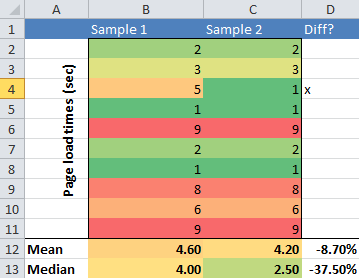Whilst I understand why median can be a better metric than mean in certain circumstances (e.g. you're creating/marketing a product, you want to use the median as it represents the biggest age group within your population and therefore real potential buyers, whereas mean age might be a number which doesn't correspond to anybody, or a very few people) I am wondering whether median is a good metric when it comes to measuring website performance.
Let's look at the below data representing page load time (in sec, the smaller the better):

Sample 1 and Sample 2 are identical, except for C4, meaning the website is only faster for 1 person. Yet, the median changes significantly between the 2 samples (nearly 40% improvement) whereas the mean is much more stable (less than 10% difference).
Accordingly my take on this is that mean is more accurate are representing the page load time.
Do you agree? / Is my observation biased because of the particular samples I have chosen or would mean be more representative than median no matter the samples?

meanandmedian: does that make any sense? $\endgroup$